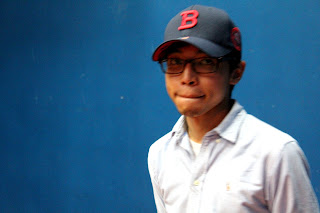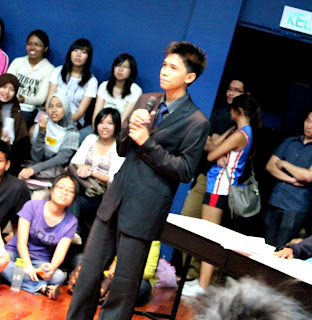George Francis Albert, a boy from Kuching Sarawak came into the program in 2009. By summer 2011, the JPA scholar was the Taylor's ADP Valedictorian (Best Student), graduated with a CGPA of 3.95 and was elected the President of the ADP Student Council for term 2010 - 2011. George Francis Albert was an outstanding student.
We asked him to explain what did he thought about his ADP experience, and here is his reply.
 |
| George is currently studying in University of Wisconsin Madison double majoring in Economics and Finance |
What started out as a mystery, ended up being the
best experience I’ve had so far in my post secondary education. During my time
in ADP, I was given numerous opportunity to lead be it in class or in clubs and
society, I was given the opportunity to work on events with the management of
ADP be it as a volunteer or part of the organizing committee, I was exposed to
many different things that I never thought I would have done from organizing a
charity concert that raised over RM 3000 for an orphanage to having to cook and
sell my cooking as part of an Accounting project. I never imagined having the
privilege of doing such things and one by one opportunity opened up which
helped develop me as a person overall. The best part of all this is that it’s
just not limited to me; it’s open to every ADP students who wants to make the
best out of their post secondary education.
 |
| George giving his valedictorian speech |
Things get even better when one realize that in ADP,
it’s not all about academics and studying all the time. I got to have fun
through the many events that are organized for ADP students, got to mingle
around with students and lecturers alike (mingling with the lecturers is
definitely the most awesome part, because it’s from there that you actually
realize that they actually do have some sense of humor and not all are out to
fail you in class) and despite all the playing, everyone (well mostly everyone)
ends up scoring well for tests and exams because here in ADP, we play hard but
we study harder.a
ADP also has their own space and this is what makes
us special as we are like a community. There is no way possible one can walk
the corridors of the classrooms and not recognize anyone on their way. As the
saying goes, “One does not simply walk around without a familiar face saying hi
to you.” It’s moments like this that made my time in ADP truly special as being
an outstation student (I was from the east side of Malaysia), the community
that we have here in ADP made me feel at home. ADP was like a second home to me
and up till today, even though it’s been almost a year since I left to pursue
my studies here in the University of Wisconsin-Madison, I still miss the
moments I had, the friends that I made (especially the big-nosed Jim Chua) and
the time where I had to bid farewell to ADP.
As for potential students who may or may not read
this, I kid you not when I say most of the current students definitely share
the same perspective that I have. You can come for a visit just to see the
atmosphere and you will know and understand what I am talking about. Take it
from a guy who has undergone the ADP experience as I would like to call it, and
make it yours if you do decide to join ADP. You too can create your own ADP experience,
just like the rest of us.
If you would like to experience what George had experience, come join us at Taylor's ADP, where you create your own experience.










